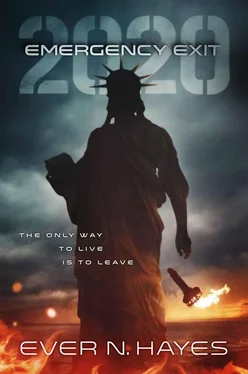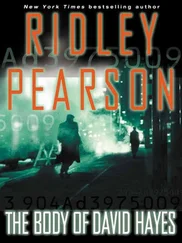TWENTY-TWO: “What the Truck?”
A little more than ten miles south, where Tie Creek Road met Highway 323, twelve of Captain Eddie’s men had seen a similar red flash on their screen but then nothing else. They ignored it, figuring it was their radar bouncing off the troops to the east, since there were no red dots beyond several dozen likely animals on their screen. Nothing large. Nothing moving fast. Deer were thick out here, and all had about the same size heat signal. This area was so remote there evidently hadn’t been any chemical bombs nearby to kill them. The troops had come across hundreds of deer today alone.
Several of the men had left the jeeps and built a small fire to make some coffee and eat a few rabbits they’d killed earlier. A couple of the others were napping, and the remaining two huddled around the radar and radio, watching for anything suspicious. At one point a solitary red dot got their heart rates up, rapidly approached their position. One of the men raised his rifle, while the other turned a spotlight in its direction. Captured by the light, a curious deer froze in its tracks, and stared the spotlight down. Then it shuffled back off into the night.
———
Back up the road, we continued to stare at our THIRST monitor. We still hadn’t seen any more flashes, nothing moving our way. We were either just outside the range of someone’s radar, or they’d shut it off to not give away their position. If they’d been approaching, we’d have seen the red dot or dots coming. But since we hadn’t seen any new dots on the screen, we still didn’t know which direction the radar ping had come from. Sitting out on a wide-open road was not the way to find out.
A hundred yards back we had passed a dirt road on the right. We reversed the vehicles back to that road and backed them into a cornfield, fortunately still full of tall stalks. It was possible while we’d been stocking up at the camp someone had caught up to us from behind, but nothing had shown up behind us on the radar, and if someone had been coming down that road they probably would have kept coming. In all likelihood, the ping was from up ahead. We just had no idea how far ahead.
Danny and Cameron unpacked and dressed again in their “ghost suits.” They grabbed their silencer-equipped Remington R11 sniper rifles, their high-powered Nightforce scopes and goggles, their Springfield handguns, and several clips of ammunition. They unloaded two of the mountain bikes and told the rest of us not to move for exactly one hundred minutes, until 3 a.m. on the dot. Then we were to drive straight down the highway for twenty miles at 60 mph. Somewhere between now and there, we’d hopefully meet up with them and move on together. Hopefully . “Good luck boys,” I said. And they were off.
They had been gone twenty minutes when a large red dot appeared to the north on the radar screen in our truck. It was coming fast, and we had no way to warn Danny and Cameron. I shut off the radar system in case the approaching vehicle had one that might detect ours, but in doing so we lost our ability to follow both the looming threat and the boys.
Sam, Blake, Wes and I each grabbed our night-vision goggles and a Remington 700, and crawled to the edge of the field, peeking out of the corn towards the road as the large red dot—which turned out to be a red pickup truck—blew by us. We’d covered the trucks with Mylar tarps designed to block heat from infrared technology, but we didn’t have enough Mylar blankets or time to cover ourselves, so if the red truck had been equipped with any heat-seeking technology, we’d have been easy to spot. The truck’s occupants didn’t seem interested in us though, as they continued to cruise south. We had to decide, right then and there, whether we needed to follow and help out Danny and Cameron. Wes made the executive decision not to. “They’re the experts,” he said. “We have to stay out of their way.”
Five miles south, Cameron picked up a steady hum and whistled sharply at Danny. They pulled their bikes off the road and down into a drainage ditch under the road a minute before the truck raced by. What the hell? They both scrambled up the sandy ditch wall. Cameron trained his scope up the road behind them while Danny followed the truck south through his. “Cameron,” he whispered. “Let’s go.” They hopped on the bikes and pedaled after the truck. They hadn’t gone much more than a mile when they heard the unmistakable sound of squealing tires and gunfire in the distance. There were several quick shots, ten or so, and then total silence. On a night like tonight those sounds could carry a long way, but the truck had only passed them three, maybe four, minutes ago. Somebody was a few miles ahead of them, and whoever it was had intercepted that truck.
TWENTY-THREE: “False Alarm”
Captain Eddie was on one end of the radio, demanding play-by-play commentary through the audible gunshots. His men in Montana had called in the rapidly approaching single red dot on the screen, and Eddie had nearly mobilized his entire company in their direction. He and his brother had taken off east in their jeep, but as soon as the red truck was apprehended they were called off. “Captain. It not the Americans.”
“How you know?” Eddie demanded.
“Three Spanish men, sir,” was the reply.
Spanish? Mexicans? Eddie pulled to the side of the road. He’d almost made what could have been a critical strategic mistake in moving all his men east. And for what? One stupid truck. He glanced at his brother, and Lazzo’s look said it all. Eddie was letting his emotions control him. “I know, Lazzo.” He waved off whatever his brother was about to say. “I know.” They turned their jeep around and went back to their post.
Over in Montana, the soldiers were celebrating their easy kill. One of them had turned the tape player on in the truck. Another was searching it for any food or items of interest. They had no idea how far the sound from the truck’s radio carried, nor were they paying attention to the two tiny parallel dots—with heat signals like rabbits—approaching their location on the screen. Finally, one of Eddie’s officers hollered to shut off the tape player. They did and headed back to the fire.
———
Danny and Cameron were within a mile now. They had concealed their bikes and flanked out to the right of the four encamped jeeps. They were about twenty yards from each other and approaching the fires in the distance. One of the fires turned out to be the red truck. The other was a bonfire surrounded by laughing and singing men. Cameron took position high up on a rock outcropping, about four hundred yards from the bonfire. Through his scope, he watched Danny edge closer.
In their Marine sniper training, the two of them had always been paired together. They were, in fact, the first teenage duo to win the International Sniper Competition, against the world’s best shooters. Their instructors had given them the monikers “Digger,” for Danny, and “Dice,” for Cameron. Danny’s nickname referenced the traits of his home state’s mascot—the gopher—hard to pin down, seemingly everywhere at once, and capable of wreaking havoc without being seen. Cameron’s was less complimentary. He was known as a gambler, in the field and at the card tables in the barracks. He was a risk taker and that didn’t always work in his favor. Danny was cautioned repeatedly that Cameron was going to get him killed someday, but Danny stuck with him.
Danny was qualified enough to move on to the Navy Seals and, with his reputation, they’d have been glad to have him. But Cameron was a different story. His attitude didn’t sit well with a lot of people and he had no interest in more training to even try to become a Seal. Cameron’s reckless, brawler mentality didn’t bother Danny, but it was frequently a distraction, and there was no room for distractions on this particular journey.
Читать дальше












